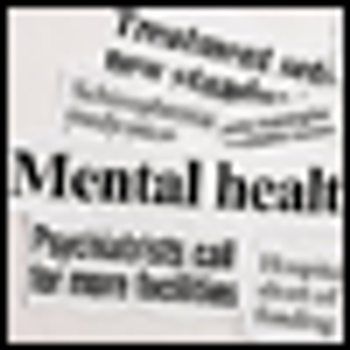
Although the child welfare system, private adoption agencies, families, schools, health care providers, and churches all provide opportunities for safely relinquishing children, tragedies continue to occur.

Although the child welfare system, private adoption agencies, families, schools, health care providers, and churches all provide opportunities for safely relinquishing children, tragedies continue to occur.

Here's a sampling of Psychoeducational Resources with live links including those available from the NIMH (NIMH Schizophrenia_ and Learning About Healthy Living.

Schizophrenia is often characterized by lack of insight, treatment nonadherence, and poor prognosis. However, research suggests that patients with schizophrenia benefit immensely from learning about their illness.

For a great list of resources that are recovery-based check out this list geared toward educating providers about recovery.

My recent blog stimulated 2 interesting responses that illustrate the stark contrast between DSM-5 fantasy and DSM-5 reality. Together they document why publication must be delayed if DSM-5 is to be set right.

Project GREAT efforts in psychoeducation are geared toward educating providers about recovery so that they can, in turn, transform their own practices to be in concert with the recovery model.

Any physician can predict death as the outcome of a fatal illness, but the physician who can predict death from among seeming randomness has certainly acquired a superior level of insight.

Father and son psychiatrists offer the following advice, in the Oslerian spirit of honoring and guiding trainees-today’s psychiatric residents-who will become tomorrow’s psychiatric leaders.

Information and topics of special interest to psychiatry residents and early career psychiatrists can be found on the Resident's Corner page. We invite you to visit.

Consumers, mental healthcare professionals, researchers and public health advocates can now access comprehensive information on all aspects of integrative mental healthcare via a new Web site launched by the International Network of Integrative Mental Health.

My three criticisms of DSM-5 have been: (1) risky suggestions; (2) bad writing; and (3) poor planning and disorganization.

The grief that the Shoah brought to its victims would make its reappearance even at happy times long afterwards.


In this guest blog, Dr Deirdre D'Orazio responds to a recent commentary by Dr Allen Frances on conducting evaluations of potential sexually violent predators.

Comorbid obesity and bipolar disorder together affect the executive functioning of patients.

Dr Angell and others may be right to claim that we should be concerned about the current practice of psychiatry. But the simple fact that mental illnesses seem to be common is not one of them.

Do you know someone that has fought the brave fight against serious mental illness? They deserve recognition and applause. Do nominate them or let them know of the Reintegration Awards.

The New York Times ran a front-page story regarding numerous controversies surrounding the DSM-5, most notably, the issue of eliminating the so-called bereavement exclusion in diagnosing a major depressive episode. Here, Dr Pies responds to Dr John Grohol, Psychologist and Editor of the Psychcentral Web site.


Dr Roger McIntyre answers a reader's question. How would you answer? Take the quiz.

Harold Bursztajn, MD, recounts the story of his parents’ survival of the liquidation of the Lodz (Poland) ghetto … how they met, fell in love, married-- and managed to survive where nearly 200,000 others perished. Ultimately, this is a story in which courage and love triumphed over evil. We invite you to watch.

I was 9 years old in December 1959 when I left and 60 in July 2011 when I returned to Lodz, Poland. My return-a journey through time as well as space-was a continuation of a trip from my home in Cambridge, Massachusetts, where I teach and practice clinical and forensic psychiatry, to Berlin, where I gave a number of presentations at a conference of the International Academy of Law and Mental Health (IALMH).

Many inmates are carried along in the structured, routine flow of the New Asylums without receiving treatment until their situation so demanded. In the case of Mr Henry, the demand came in the form of self-induced isolation.

APA Annual Meeting Page2012 Annual Meeting ScheduleScientific Program - Schedule of Meeting Sessions Meeting Registration and Course Enrollment Housing ReservationsAPA Staff Contact ListCourse Brochure [pdf]


My biggest concern regarding DSM-5 is that it will dramatically increase the rates of mental disorder by cheapening the currency of psychiatric diagnosis . . .The whole purpose of field-testing is to identify and correct problems in the preliminary DSM suggestions before they become set in stone as official guides to diagnostic practice.

Philadelphia will host this year’s annual meeting that will take place from May 3 to 5, 2012. The chosen location will be at the Loews Philadelphia Hotel at 1200 Market Street, with easy access to many of the city’s main attractions.

European Psychiatric Association CongressMarch 3 – 6, 2012, in Prague, Czech Republic. The Congress theme, “Beyond Diversity, Towards Harmony,” illustrates the goals of this high-level psychiatric congress to unite diverse groups of specialists from many countries and cultures in an exploration of the most important aspects of diagnosis, research, and treatments in psychiatry and neuropsychiatry. In addition, the Congress provides a venue for psychiatrists from all over the world to meet, share experiences, and network.

Here, Mr Hazelwood answers questions about serial murderers that are commonly posed to him. The term serial murderer (or serial killer) was not even a part of the forensic lexicon until the 1970s . . .

As I near the 1-year anniversary of my crowning as a World’s Expert, it seems like only yesterday that I was just an average citizen . . . I am at heart a clinician and a consummate clinician is what I aim to be.